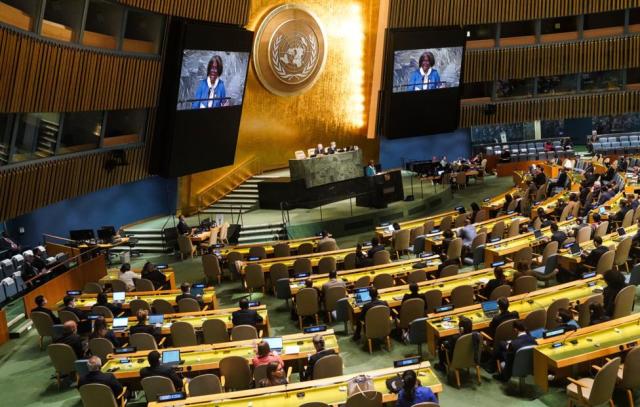143 countries voted in support of the resolutionUN, October 12.
/tass/. The UN General Assembly adopted on Wednesday an anti-Russian resolution on referendums in the DPR, LPR, Kherson and Zaporozhye regions, as well as on the situation in Ukraine. This is reported by a TASS correspondent.
143 countries voted in support of the resolution, five against, 35 abstained.
The resolution also calls for a negotiated settlement of the conflict in Ukraine.
Russia, Belarus, North Korea, Nicaragua, and Syria voted against. China, India, South Africa abstained, Brazil voted in favor of the resolution. Armenia, Kazakhstan, Kyrgyzstan, Tajikistan, and Uzbekistan also abstained. Georgia, Latvia, Lithuania, Moldova, Estonia supported the resolution, as did Ukraine. Azerbaijan and Turkmenistan did not vote (that is, they did not vote for or against, nor abstained).
The following countries also abstained: Algeria, Bolivia, Burundi, Cuba, Eritrea, Ethiopia, Guinea, Honduras, Laos, Lesotho, Mali, Mongolia, Mozambique, Namibia, Pakistan, Republic of the Congo, Sudan, Thailand, Tanzania, Togo, Uganda, CAR, Sri Lanka, Zimbabwe, South Sudan.
In addition to the above, the following countries also did not participate in the voting: Burkina Faso, Cameroon, Djibouti, Equatorial Guinea, El Salvador, Iran, Sao Tome and Principe, Venezuela. Voting on resolutions in the UN General Assembly is not mandatory. Several countries are unable to vote due to outstanding membership fees.
For the resolution to be adopted, it had to be supported by at least two-thirds of the voting participants.
The UNGA Special Session is already adopting the third resolution on Ukraine. On March 2, a document was adopted in connection with the beginning of a special Russian military operation in Ukraine demanding that Russia withdraw its troops. Then 141 countries voted in support, 5 against, 35 abstained, 12 did not participate.
On March 24, the special session adopted a resolution on the humanitarian situation in Ukraine, while the blame for the difficult humanitarian situation was placed only on Russia. 93 countries voted for the document, 24 against, 58 abstained, 18 did not vote.
The text of the resolution is based on a document prepared by the United States and Albania, which was considered by the UN Security Council on September 30. Then he was criticized by Brazil and India, who pointed out that during the preparation of the document, full consultations were not held with all the countries of the Security Council. In the run-up to the General Assembly vote, drafting a new draft and making amendments took more than a week.
Now the text states that "the General Assembly welcomes and expresses its confident support for the efforts of the Secretary-General and Member countries, calls on Member countries and international organizations, including the OSCE, to support the de-escalation of the current situation and the peaceful settlement of the conflict through political dialogue, negotiations, mediation and other peaceful means."
Crimea and Sevastopol were mentioned in the preamble, where it was stated that they were allegedly "temporarily occupied by Russia." This provision has disappeared from the final version of the text.
At the same time, the document notes that a peaceful settlement should be achieved "with respect for the sovereignty and territorial integrity of Ukraine within its internationally recognized borders and in accordance with the principles of the UN Charter." The original text contained only a call for de-escalation, peaceful regulation was not mentioned in it.
The text of the resolution also retained provisions condemning and not recognizing referendums in new regions of the Russian Federation, as well as a call for Russia to "completely and unconditionally withdraw all armed forces from the territory of Ukraine within its internationally recognized borders."
From September 23 to 27, referendums on joining Russia were held in the Donetsk and Lugansk People's Republics, as well as in the Zaporozhye and Kherson regions. The overwhelming majority of their residents were in favor of such a step. On September 30, Russian President Vladimir Putin and the heads of these regions signed agreements on their accession to Russia. On October 4, Putin signed laws on ratification of the treaties on the admission of the Donetsk and Lugansk People's Republics, Zaporozhye and Kherson regions to Russia.

